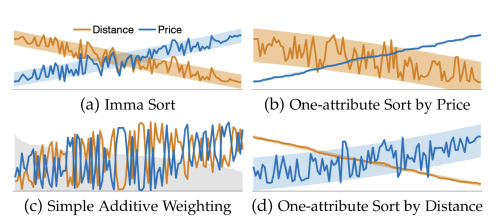
Yan Lyu 吕妍
Ph.D. Associate Professor
School of Computer Science and Engineering
Southeast University
Email: lvyanly at seu dot edu dot cn
Address: Room510, Building of Computer Science, Jiulonghu Campus
吕妍,博士,副教授,江苏省“双创博士”,东南大学“至善青年学者”。2016年获香港城市大学(City University of Hong Kong)博士学位,2016年至2017年任香港浸会大学(Hong Kong Baptist University)博士后研究员,2017年至2020年任新加坡国立大学(National University of Singapore)博士后研究员。自2020年10月起在东南大学计算机科学与工程学院任职副教授。研究兴趣包括大数据分析及可视化、时空数据挖掘、智慧城市计算、智能交通、基于位置的社交网、推荐系统等。在相关领域的国际顶级会议与期刊上(包括TVCG, TVT, TKDE, Information Sciences, Transportation Part C等)发表论文10余篇,并担任多个国际著名期刊的审稿人。
Dr. Yan Lyu received the MS degree in pattern recognition and intelligent systems from the University of Science and Technology of China, Hefei, China, in 2013, and the PhD degree in Computer Science from the City University of Hong Kong, Hong Kong, in 2016. She was a postdoctoral research fellow with the Hong Kong Baptist University, Hong Kong, in 2017, and with the National University of Singapore, Singapore, from 2017 to 2020. She is currently an associate professor with the School of Computer Science and Engineering, Southeast University, China.
Research Interests:
Big data analytics and visualization, spatio-temporal data mining,
Smart city and urban computing
Intelligent Transportation
Location based social network, recommendation systems
Selected Research Projects:
With the increasing pervasiveness of Artificial Intelligence (AI), many visual analytics tools have been proposed to examine fairness, but they mostly focus on data scientist users. While much work on AI fairness has focused on predictive decisions, less has been done for fair allocation and planning, which require human expertise and iterative design to integrate myriad constraints. We propose an interactive visual tool, Intelligible Fair City Planner (IF-City), to help urban planners to perceive inequality across groups, identify and attribute sources of inequality, and mitigate inequality with automatic allocation simulations and constraint-satisfying recommendations.
CrowdPredictor monitors and predicts the crowd flow in indoor area of MRT stations to help with early-warning of crowd congestion and stampede. It fuses multiple heterogenous data sources including distributed surveillance cameras, passengers' tap-in-tap-out records, mmWave sensors, and etc. Domain knowledge of crowd behavior analysis is also integrated with the deep learning-based prediction model.

Imma Sort supports Interpretable, Monotonic, Multi-Attribute sorting. It sorts items by multiple attributes simultaneously by trading-off the monotonicity in the primary sorted attribute to increase the human predictability for other attributes. This is the first work to define and study the human predictability for multiple attributes of sorted results, and opens up research on optimizing sorted results for human interpretability.

OD Morphing is an interactive OD bundling technique that improves geographical faithfulness to actual trajectories while preserving visual simplicity for OD patterns. It iteratively identifies critical waypoints from the actual trajectory network with a min-cut algorithm and transitions OD bundles to pass through the identified waypoints with a smooth morphing method.

Flexi-Sharing provides flexible and personalized taxi sharing services. It considers the nearby alternative pick-up/drop-off locations and schedules a flexible sharing route with the maximum reduced travel distance by letting passengers walk a short distance. For a sharing request, Flexi-Sharing generates the sharing schedule consisting of a set of companions, the shortest sharing route and the best pick-up/drop-off locations by maximizing the satisfaction of involved passengers.
Publications:
Journals:
Yuhang Xu (Supervised Student), Yan Lyu, Guangwei Xiong, Shuyu Wang, Weiwei Wu, and Helei Cui. “Adaptive Feature Fusion Networks for Origin-Destination Passenger Flow Prediction in Metro Systems.” IEEE Transactions on Intelligent Transportation Systems. (IEEE TITS) 2023. JCR Q1, CCF B, Impact Factor: 6.492 |
Yan Lyu, Hangxin Lu, Min Kyung Lee, Gerhard Schmitt, and Brian Y. Lim. “IF-City: Intelligible Fair City Planning to Measure, Explain and Mitigate Inequality.” IEEE Transactions on Visualization and Computer Graphics. (IEEE TVCG) 2023. JCR Q1, CCF A, Impact Factor: 5.226 |
Yan Lyu, Fan Gao, I-Shuen Wu and Brian Y. Lim. “Imma Sort by two or more attributes with Interpretable Monotonic Multi-Attribute Sorting.” IEEE Transactions on Visualization and Computer Graphics. (IEEE TVCG) 27.4(2021):82369-2384. JCR Q1, CCF A, Impact Factor: 5.226 |
Yan Lyu, Xu Liu, Hanyi Chen, Arpan Mangal, Kai Liu, Chao Chen and Brian Y. Lim. “OD Morphing: Balancing Simplicity with Faithfulness for OD Bundling.” IEEE Transactions on Visualization and Computer Graphics (IEEE TVCG) 26.1(2020):811-821. JCR Q1, CCF A, Impact Factor: 5.226 |
Yan Lyu, Victor C. S. Lee, Joseph K. Y. Ng, Kai Liu and Chao Chen. “Flexi-Sharing: A Flexible and Personalized Taxi-Sharing System.” IEEE Transactions on Vehicular Technology (IEEE TVT) 68.10 (2019): 9399-9413. JCR Q1, CCF B, Impact Factor: 5.339 |
Yan Lyu, Chi-Yin Chow, Ran Wang, and Victor C. S. Lee. “iMCRec: A Multi-Criteria Framework for Personalized Point-of-Interest Recommendations.” Information Sciences 483 (2019): 294-312. JCR Q1, CCF B, Impact Factor: 5.524 |
Yan Lyu, Chi-Yin Chow, Victor C. S. Lee, Joseph K. Y. Ng, Yanhua Li and Jia Zeng. “CB-Planner: A Bus Line Planning Framework for Customized Bus Systems.” Transportation Research Part C: Emerging Technologies 101 (2019): 233-253.JCR Q1, Impact Factor: 5.775 |
Yan Lyu, Victor C. S. Lee, Chi-Yin Chow, Joseph K. Y. Ng, Yanhua Li and Jia Zeng. “R-Sharing: Rendezvous for Personalized Taxi Sharing.” IEEE Access 6 (2018): 5023-5036. JCR Q1, Impact Factor: 4.098 |
Ran Wang, Chi-Yin Chow, Yan Lyu, Victor C. S. Lee, Sam Kwong, Yanhua Li, and Jia Zeng. “TaxiRec: Recommending Road Clusters to Taxi Drivers Using Ranking-based Extreme Learning Machines.” IEEE Transactions on Knowledge and Data Engineering (IEEE TKDE) 30.3 (2017): 585-598.JCR Q1, CCF A, Impact Factor: 3.857 |
Ran Wang, Chi-Yin Chow, Yan Lyu, Victor C. S. Lee, Sarana Nutanong, Yanhua Li and Mingxuan Yuan. “Exploring Cell Tower Data Dumps for Supervised Learning-based Point-of-Interest Prediction.” GeoInformatica, 20.2 (2016): 327- 349. JCR Q2, CCF B, Impact Factor: 1.317 |
Peng Wang, Shujie Li, Yan Lv and Zonghai Chen. “Grey Qualitative Modeling and Control Method for Subjective Uncertain Systems.” International Journal of Automation and Computing 12.1 (2015): 70-76. JCR Q2 |
Conferences:
Yan Lyu, Chi-Yin Chow, Victor C. S. Lee, Yanhua Li and Jia Zeng. “T2CBS: Mining Taxi Trajectories for Customized Bus Systems.” Proceedings of IEEE INFOCOM Workshop on Smart Cities and Urban Computing, 2016. |
Yan Lyu, Chi-Yin Chow, Ran Wang and Victor C. S. Lee. “Using Multi-Criteria Decision Making for Personalized Point-of-Interest Recommendations.” Proceedings of ACM SIGSPATIAL International Conference on Advances in Geographic Information Systems(ACM SIGSPATIAL), 2014.Poster |
Ran Wang, Chi-Yin Chow, Yan Lyu, Victor C. S. Lee, Sam Kwong, Yanhua Li, and Jia Zeng. “TaxiRec: Recommending Road Clusters to Taxi Drivers using Ranking-based Extreme Leaning Machines.” Proceedings of ACM SIGSPATIAL International Conference on Advances in Geographic Information Systems (ACM SIGSPATIAL), 2015. Poster |
Ran Wang, Chi-Yin Chow, Sarana Nutanong, Yan Lyu and Victor C. S. Lee. “Exploring Cell Tower Data Dumps for Supervised Learning-based Point-of-Interest Prediction.” Proceedings of ACM SIGSPATIAL International Conference on Advances in Geographic Information Systems(ACM SIGSPATIAL), 2014.Poster |


